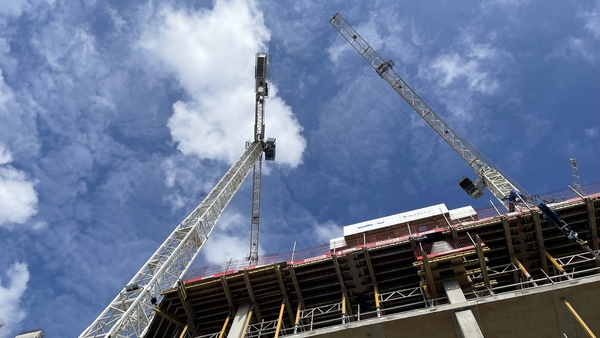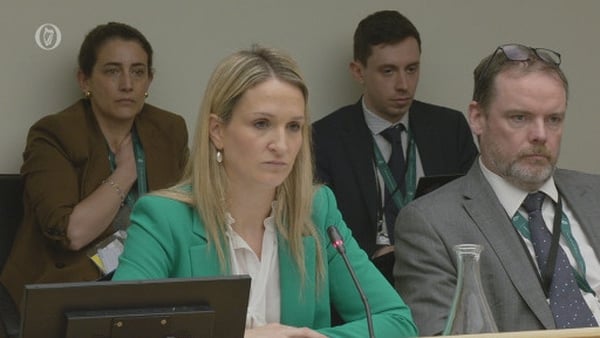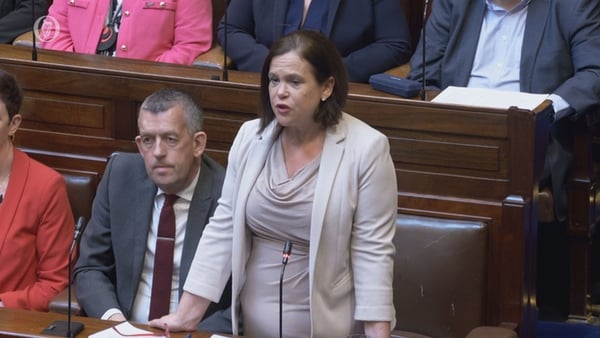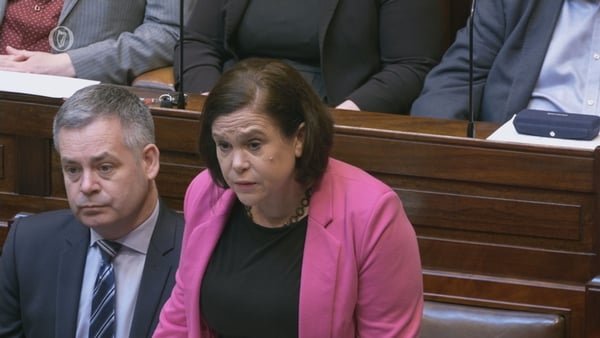The Cabinet has approved a "fully-funded" scheme to repair up to 100,000 homes with building defects.
Minister for Housing Darragh O'Brien said remediation work already completed, or currently under way, on apartments and duplexes will be covered by the scheme.
The minister said the cost of the scheme could run to €2.5 billion and will cover 100% of costs.
He said fire safety is the biggest issue followed by water ingress problems in these properties.
The legislation to establish the scheme will take a number of months to pass through the Oireachtas.
"We would expect some payments to be made this year but more next year as the scheme is stood up," Minister O'Brien said.
The measure is set to cover these buildings, which were constructed between 1991 and 2013.
Speaking to RTÉ's Six One News, Minister O'Brien said there will be no cap on the cost of repairs under the scheme.
He said they are looking at an average cost per unit of €25,000, some will be less and some will be significantly more.
"We have estimated the overall cost of this scheme will range between €1.6bn and €2.5bn, but I have been very clear today that it will be a fully funded scheme," the minister said.
Read more
Defects scheme must be 'fit for purpose'
Call for levy on developers to offset remediation payments
He said work that is certified and done to standard will be paid for. For people who have already commenced work or who are about to do so, from today, all of those costs will be covered.
"A lot of apartment owners are engaging in work to make their apartment safe, we want that to continue," he said, adding that the scheme will involve between 62,500 and 100,000 homeowners.
In relation to defective concrete blocks, Minister O'Brien said significant changes have been made.
"We have an upward cap of about €420,000 per home. We have allowed an additional home in on top of that if it is a Residential Tenancies Board registered rental tenancy.
"And we are actually reassessing the cost within that scheme as I said I would do. That's being done by the SCSI right now.
"We are very close to finalising the regulations of that scheme and we have seen an increase in the applications in Donegal, Mayo and other affected counties," he said.
Minister O'Brien said 99% of the properties that they have been able to assess will be covered under the new defective concrete block scheme.
He said part of today's decision is to move forward with the establishment of an independent building standards regulatory authority to make sure that issues like this cannot happen again.
'Some badly needed clarity'
The new housing defects scheme is expected to be administered by the Housing Agency.
It is envisaged that owners' management companies will be funded to carry out the works, which will cover entire buildings to improve the safety of all occupants.
Tánaiste Micheál Martin said property owners will be given "some badly needed clarity" through the new scheme.
Mr Martin said the initiative is designed to "benefit those who have significant defects in terms of their apartments and so on".
He added that the funding for the scheme would come from the Exchequer and said "the issue now is to get on and get it delivered for those who have suffered from this".
Minister for Housing Darragh O'Brien said remediation work already completed or currently under way on apartments and duplexes will be covered by the building repair scheme | Read more: https://t.co/18hoZhOIGP pic.twitter.com/KGVjnYob0i
— RTÉ News (@rtenews) January 18, 2023
People Before Profit has called for a levy to be imposed on developers and the property industry to help pay for the costs of remediating defective apartments.
Richard Boyd Barrett said that should "not be a block on the State guaranteeing full remediation and full retrospection for the tens of thousands of people whose homes are defective from fire safety or water egress".
Eamon O'Boyle, Fire Safety Consultant at Eamon O'Boyle Associates and former assistant chief fire officer with Dublin Fire Brigade, said there is a "huge amount" of defective apartments and he expects there are issues with hospitals, hotels and nursing homes as well.
Speaking on RTÉ's Today with Claire Byrne, he said a lot of buildings had no cavity barriers so that if a fire were to break out in one apartment, the smoke would travel through that cavity and into other apartments.
"There are barriers put into these to prevent that happening and that's one of the things that’s missing in many of the apartments ... and it's a very difficult thing to remediate," he said.
In a statement, the Department of Housing said a "whole building" approach would be taken, "ensuring common areas and shared spaces are also remediated where required to the relevant standard".
The department said to "ensure that important life-safety works are not paused", the Government had "decided that remediation works related to fire safety defects, entered into or commenced from today, will form part of the remediation scheme, subject to terms and conditions.
"Such works will need to be agreed with local authority fire services and the details of this process will be worked out as a priority and provided in due course."
The department said the scale of the defects is significant.
In July 2022, it was estimated that 50% to 80% of apartments and duplexes constructed between 1991 and 2013 may be affected by one or more fire safety, structural safety or water ingress defects.
Sinn Féin's Housing spokesperson Eoin Ó Broin described the scheme as "a step in the right direction".
Speaking on RTÉ's Drivetime, he said the devil is in the detail and the minister should publish the general scheme of the bill as quickly as possible in order to get initial answers to many questions.
"If an owners' management company is to proceed with the works, they need to know what is going to be refunded and what is not if we are going to have 100% retrospective redress as well," he said.
Mr Ó Broin said the crucial point is that there is no money in the Budget allocation for 2023 for any of this work.
"Therefore, very quickly, we need to know what money is available this year for those emergency works but also how much money is going to be available next year and the year after," he said.
Speaking on the same programme, the deputy chair of the Oireachtas Housing Committee said works that are required now, such as fire safety, structural and water ingress, can be carried out "and they will then be included in any scheme, even in advance of that scheme being finalised".
"Because that ensures that the work is carried out by the owners' management company and there is not a moral hazard of waiting to see whether it will be covered or not," Paul McAuliffe said.
He said owners' management companies, on a whole of building basis, can carry out works from today and will be eligible to recoup those costs.
He said that while it is an important day for those who have campaigned, there is still a significant amount of work to be done to make sure all the details are ironed out, citing cash flow implications as one example of an issue that will need to be addressed.
"Even though the works will be covered now, what happens if the owners' management company don't have the money up front to be able to do that," he said.






